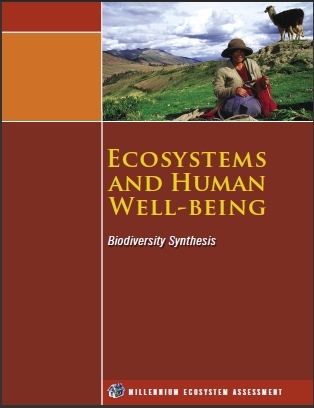Ecosystems and Human Well-being: Biodiversity Synthesis: Foreward
This is part of the Millennium Ecosystem Assessment report Ecosystems and Human Well-Being: Biodiversity Synthesis
Extended Writing Team: MA Coordinating Lead Authors, Lead Authors, Contributing Authors, and Sub-global Assessment Coordinators
Review Editors: José Sarukhán and Anne Whyte (co-chairs) and MA Board of Review Editors
The Millennium Ecosystem Assessment set out to assess the consequences of ecosystem change for human well-being and to establish the scientific basis for actions needed to enhance the conservation and sustainable use of ecosystems and their contributions to human well-being. Biological diversity plays a critical role in underpinning ecosystem services. Governments supported the establishment of the MA through decisions taken by the Convention on Biological Diversity and other international conventions. The MA was initiated in 2001 under the auspices of the United Nations and governed by a multistakeholder board that included representatives of international institutions, governments, indigenous peoples, NGOs, and business. The secretariat was coordinated by the United Nations Environment Programme. More than 1,360 scientists from 95 countries contributed to the assessment.
This report presents a synthesis and integration of the findings concerning biodiversity contained in the reports of the four MA Working Groups (Condition and Trends, Scenarios, Responses, and Sub-global Assessments). From the outset, the MA was designed to meet the needs of the Convention on Biological Diversity, among other users. The Conference of the Parties welcomed the contribution of the MA to the assessment work of the Convention. It encouraged Parties to participate in the MA and nominated the Chair of the Subsidiary Body on Scientific, Technical, and Technological Advice and the Executive Secretary to be represented on the MA Board. Parties to the CBD have provided review comments on underlying chapters of the assessment as well as this synthesis report. In addition, the penultimate draft of the synthesis report was presented to the tenth meeting of SBSTTA in February 2005, and the comments made there were taken into account in its finalization. As requested by the Conference of the Parties, SBSTTA will consider the final products of the Millennium Ecosystem Assessment at its eleventh meeting—including this synthesis report on biodiversity—in order to prepare recommendations to the Conference of the Parties concerning the implications of the findings for the future work of the Convention.
This report would not have been possible without the extraordinary commitment of the more than 2,000 authors and reviewers worldwide who contributed their knowledge, creativity, time, and enthusiasm to the development of the assessment. We would like to express our gratitude to the Synthesis Team that prepared this report and to the MA Assessment Panel, Coordinating Lead Authors, Lead Authors, Contributing Authors, Board of Review Editors, and Expert Reviewers who contributed to this process, and we wish to acknowledge the in-kind support of their institutions, which enabled their participation. We would also like to thank the current and past members of the MA Board (and their alternates), the members of the MA Exploratory Steering Committee, the Convention on Biological Diversity secretariat staff, and the MA secretariat staff, interns, and volunteers for their contributions to this process.
We are extremely grateful to the donors that provided major financial support for the MA: Global Environment Facility; United Nations Foundation; The David and Lucile Packard Foundation; The World Bank; Consultative Group on International Agricultural Research; United Nations Environment Programme; Government of China; Ministry of Foreign Affairs of the Government of Norway; Kingdom of Saudi Arabia; and the Swedish International Biodiversity Programme. The full list of organizations that provided financial support to the MA is available at www.MAweb.org.
We hope that this report will prove useful to all those concerned with the Convention on Biological Diversity and with its objectives—the conservation and sustainable use of biological diversity and the fair and equitable sharing of benefits arising from the use of genetic resources.
Dr. Robert T. Watson
MA Board Co-chair
Chief Scientist, The World Bank
Dr. A.H. Zakri
MA Board Co-chair
Director, Institute for Advanced Studies, United Nations University
Hamdallah Zedan
Executive Secretary
Convention on Biological Diversity
Terms of Use
The copyright for material on this page is the property of the World Resources Institute. Click here for the Terms of Use (Ecosystems and Human Well-being: Biodiversity Synthesis: Foreward).
Disclaimer: This chapter is taken wholly from, or contains information that was originally written for the Millennium Ecosystem Assessment as published by the World Resources Institute. The content has not been modified by the Encyclopedia of Earth.
|
|
